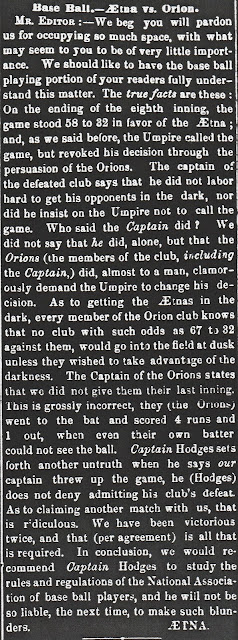Unfortunately I was again unable to make this week's Neshanock game, a visit to South Orange, New Jersey to take on the local town team. Multiple sources confirm that Flemington held the lead going to the top of the ninth, but the host club rallied for three runs and a two run lead headed to the bottom of the inning. As they have all season, the Neshanock rallied, scoring once and putting the tying run on third, but this time it was not to be and the South Orange club held on for a 13-12 win. A lone source informs me the Flemington attack was led by Bobby "Melky" Ritter, Dan "Lefty" Gallagher and David "Illinois" Harris with three hits apiece. According to the same source, "Illinois" parleyed his three hits into a clear score and also stole six bases, three times when his wily base running skills forced the opposing pitcher into a balk or at least that's what I'm told. But who could possibly question the veracity of a gentlemanly 19th century base ball player, even a 21st century re-creator.
Photo courtesy of Karen Marlowe's Facebook Page
Just one example of base ball's gentlemanly is past is how detailed newspaper accounts of matches invariably ended with the phrase "the umpire's decisions gave satisfaction to all" or words to that effect. It was apparently a standard formula to emphasize base ball's gentlemanly nature even in the heat of competition. While that was probably to some extent wishful thinking even then, by the beginning of the post Civil War era, winning became the priority with little being done to disguise that reality. The below exchange in a Jersey City newspaper in 1866, between what were most likely junior clubs, illustrates the changing nature of the game and the extent to which those disputes became public.
American Standard (Jersey City) - July 14, 1860
American Standard - July 16, 1866
This was clearly not unique to the Orion and Aetna clubs since a similar dispute between the Una and National clubs later in the season, led the paper to wisely opt out of another dispute.
American Standard - September 26, 1866
Daily Times (Jersey City) - July 30, 1869





No comments:
Post a Comment